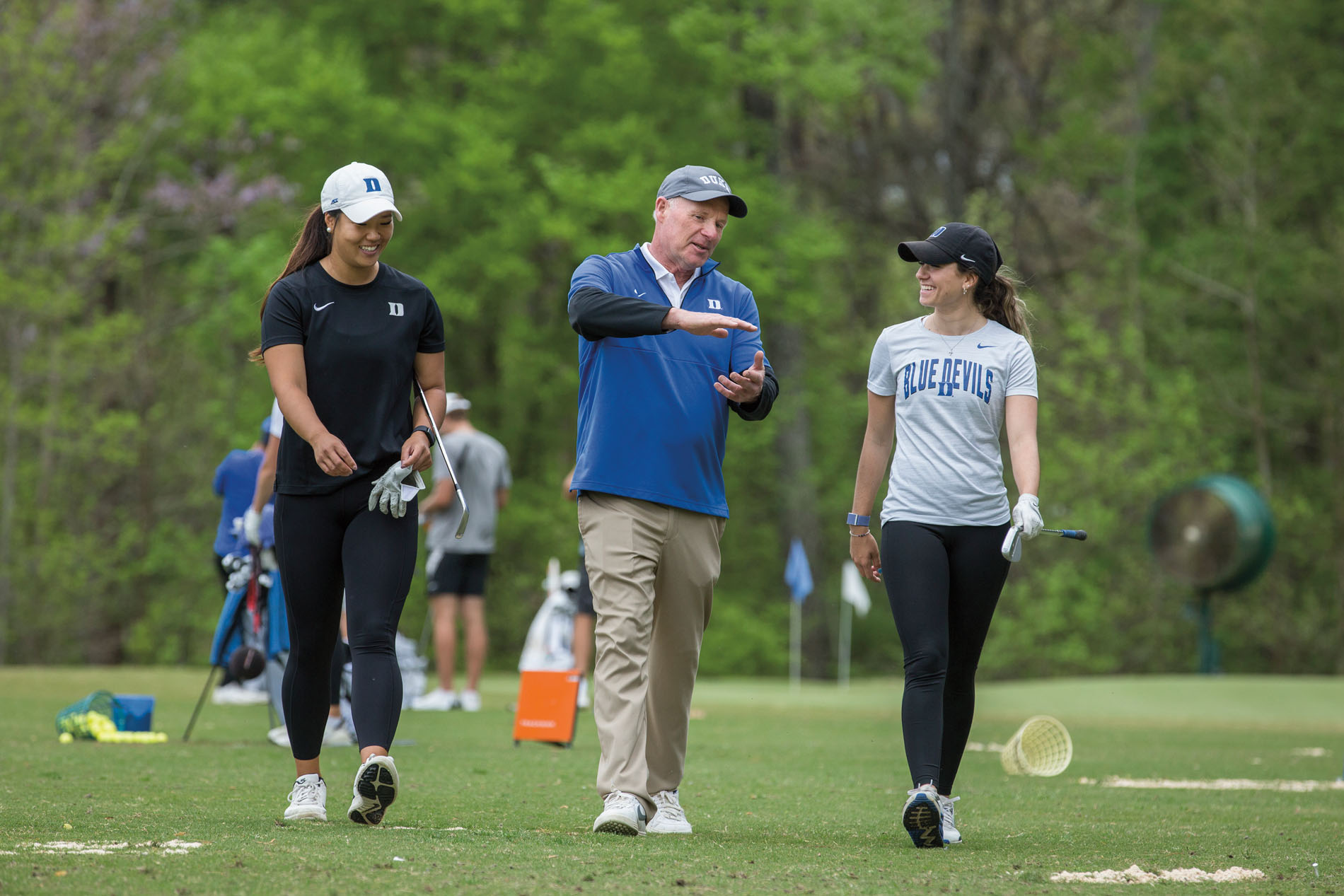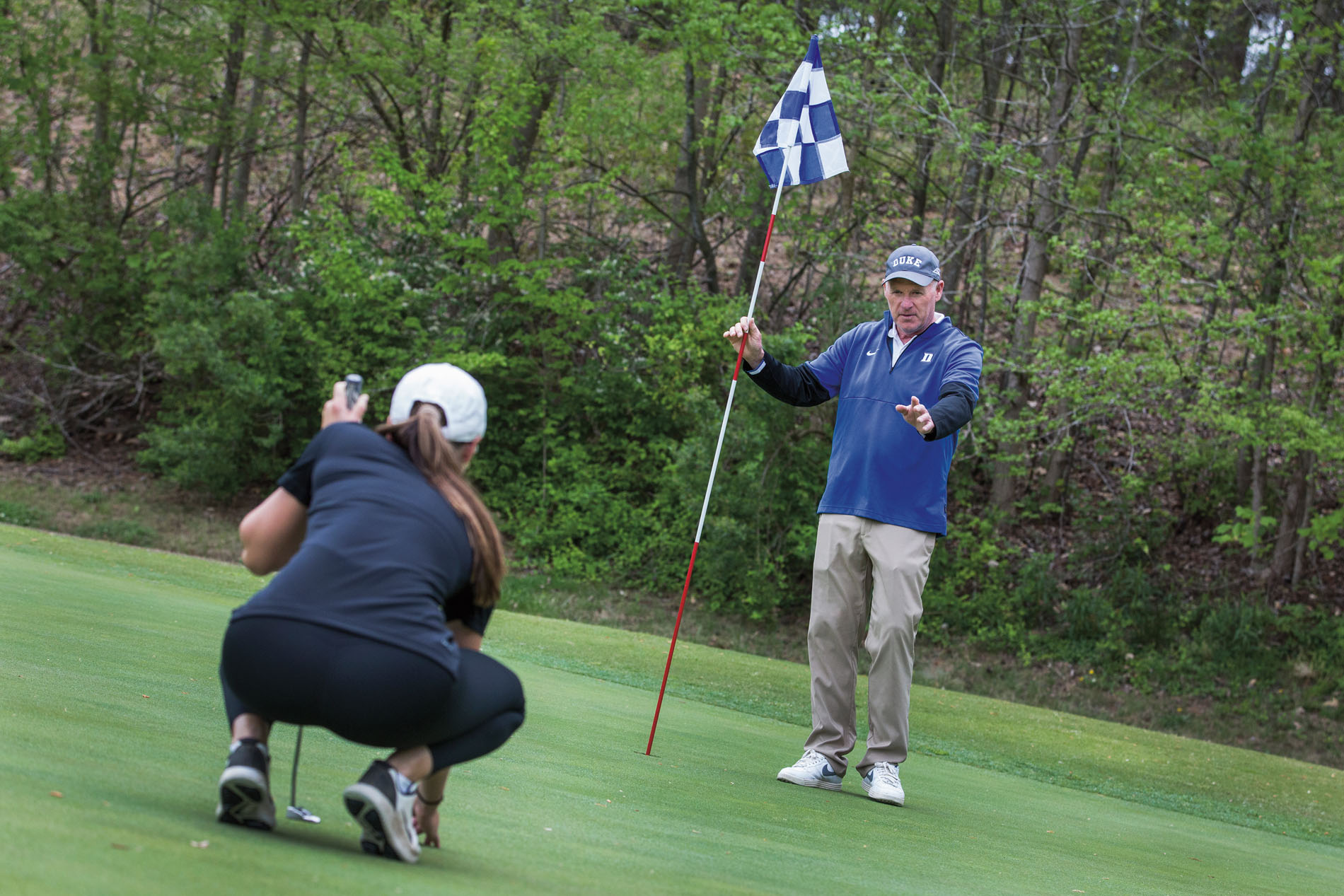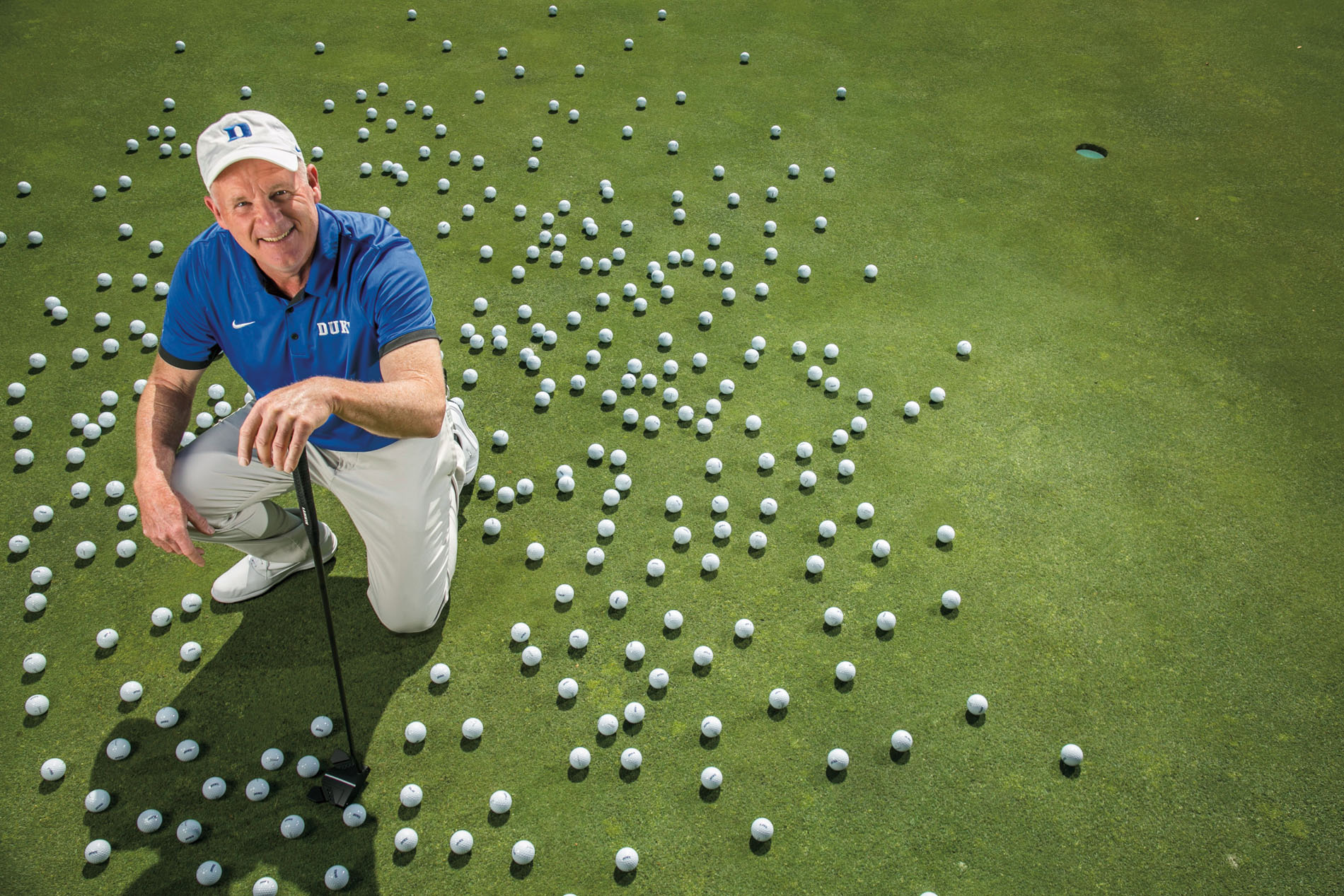To succeed in golf, you need great technique, a steady hand, and a calm mind.
Anyone who’s ever swung a club can tell you that combination is difficult to achieve, and nearly impossible to keep consistent. Now think about teaching five or six golfers to do that every year for four decades, and you get an idea of what Dan Brooks has accomplished at Duke.
Over 40 seasons, Brooks A.M.’96 has led the women’s golf team to seven national championships and guided four players to individual NCAA titles. He is the winningest coach in women’s Division I golf history: No one else is close to his championship total or his 143 team victories.
Brooks jokes that he had no choice but to play golf as a child growing up in eastern Oregon’s Baker City. His grandfather lived and worked on a nine-hole golf course a few hours away in Buhl, Idaho. Brooks spent summer vacations swinging a club with his grandfather and, later, helping him maintain the course.
Although he was one of the top golfers on his team at Oregon State University, Brooks self-deprecatingly describes his squads as “mediocre” and his three different head coaches in four years as “great guys, but they were just doing it on the side. I’m not sure they were paid anything.” He had loose plans for graduate school when he took a job as an assistant pro at Crane Creek Country Club in Boise, Idaho, teaching lessons and dreading his shift in the pro shop.

Soon he came to really enjoy teaching, so when a local golf coach walked in one day with a flyer for a coaching job at Duke, it got his attention if not his immediate interest.
“My response was, ‘I don’t think I want to move to Texas,’” Brooks laughs. “I swear that’s what I said. I don’t know what I had against Texas.”
Great technique
Once he knew a bit more about Duke, it seemed like a great way for Brooks to hedge his bets. He figured he could coach at Duke and teach private lessons, using his earnings to pay for coaching seminars. He was hired as the head coach of the women’s team, assistant for the men’s team, and supervisor of the golf course.
“It was a way to have an adventure and be next to a university,” Brooks says, “and if golf wasn’t my deal, then maybe there would be opportunities.”
Turns out that the more Brooks learned about coaching and teaching, the more he loved it and the better he got. As he improved, his administrative responsibilities at the golf course began to chafe. On two separate occasions, he asked athletic director Tom Butters to reduce his course duties so he could focus on teaching and coaching. Butters agreed, and suddenly Brooks was a professional golf coach who only coached golf.
“That made things a lot better,” Brooks says. “I was able to put my energy into where I wanted to go. I was more effective with the team.”
Steady hand
Brooks realized quickly that Duke golfers were driven and highly intelligent. So, in addition to working on his coaching skills, he dedicated himself to knowing his players inside and out – their swing, their short game, their parents, their habits, their fears, their favorite flavor of ice cream.

This diligence enables Brooks to understand what motivates his golfers and what they need to excel. He avoids cluttering their mental game with unsolicited advice, but when asked, he’s always well-prepared to offer help.
“If they ever say, ‘Coach, I don’t know why it’s curving to the right all the time,’ I’ve got to have answers,” Brooks says. “That’s a lot to pay attention to, to make sure I can be useful. I’m just very aware of things.”
Amanda Blumenherst Freiman ’09, a three-time national player of the year and member of two NCAA title teams, says Brooks approaches his job with a humble mindset of continuous improvement. She says his success never impedes his willingness to make needed changes.
“Even after so many national championships, he was still altering the practices and the workouts to add new information that he had learned that was going to make the teams better,” Freiman says. “He didn’t get stuck in a rut of, ‘Well, this has worked for me in the past, so this is what creates a championship team.’ He was very good at also knowing what his specific players needed.”

Calm mind
Anna Grzebien Vanderlinde ’07, the 2005 NCAA individual champion and a member of three national championship teams, agrees. She says it felt like Brooks was never flustered and always knew exactly what to do – when to be a coach, a surrogate dad, a friend, or a listener.
Brooks’ famously calm demeanor on match days might be his most defining and endearing trait. “He was just so into preparation that once we got to the event, he didn’t need to be over the top like some of the coaches,” Vanderlinde says. “It’s nerve-wracking enough. You don’t need some high-strung coach on top of it.”
Freiman says that it was a normal occurrence for Brooks to be completely chill while other coaches were stressing out, pacing and giving instructions to their players. “Coach would be sitting on the bench of the driving range reading a newspaper, and being like, ‘Just keep doing what you’re doing,’” she says. “That was always kind of our little slogan for him, ‘Keep doing what you’re doing.’”
Staying consistent
Phoebe Brinker ’24, the 2022 ACC individual champion, says that Brooks made her Duke experience outstanding. “He’s great at just reassuring me to just believe in myself,” she says. “It’s less technical and more mental game stuff. And then just being dependable and solid … when we win, it’s never insanely crazy excitement, but then when we’re at the bottom, it’s not crazy sad.”
The question now is how long Brooks will keep at it. At 65 years old, he’s still eager to go to work every day. “I’m very, very fortunate to have a job where I can still be happy to do it,” he says. “The kids are what keep me excited. They’ve been fantastic. I’ve had some wonderful players – that’s what keeps me here. There’s no question in my mind that the main thing is just being around these great young people.”
